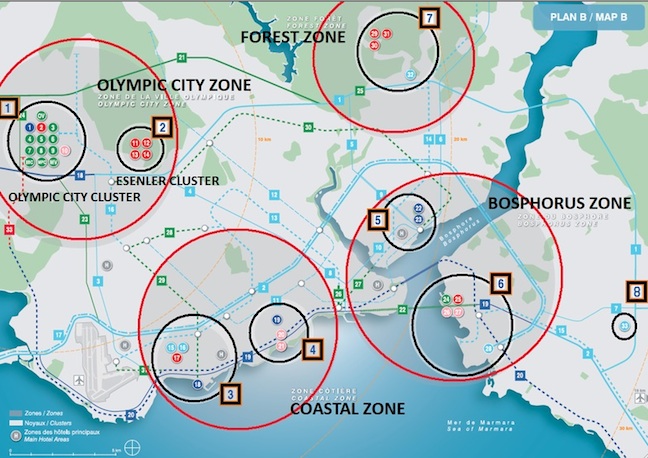On Saturday, the International Olympic Committee opted to host the 2020 Olympic games in Tokyo rather than Madrid or Istanbul. All three cities have been plagued by issues that make them risky venues in the eyes of the IOC: a nuclear disaster, austerity and recession, and mass protest, respectively. Nonetheless, it is telling that the IOC considers Tokyo, with an environmental catastrophe on its doorstep, to be a safer bet than Istanbul.
In response to Istanbul`s Olympic bid, a coalition of architects, urban planners, and activists formed under the banner of “Boycott Istanbul 2020.” The group was a presence this week during protests in Istanbul and Ankara, dovetailing their concerns over massive Olympic-style development with demonstrations against the planned demolition of a forest on Middle East Technical University`s campus.
Such an initiative is clearly an outgrowth of the same movement over urban land use and environmental devastation that sparked the demonstrations that began in Gezi Park in May. In Istanbul, the Olympics were to become a wedge to advance the government`s development agenda. This is most especially apparent when looking at the proposed developments in Haydarpaşa and the northern Belgrade forest. The government`s own website for the 2020 Olympic bid states in plain language that “the redeveloped Haydarpaşa Port will be the focal of the Bosphorus Zone. The Olympic Games will provide the catalyst for this project, one of the most significant urban projects planned for the City of Istanbul.” Haydarpaşa is currently primarily comprised of public buildings, but the government has stated it wishes to commercialize the port area.
Likewise, the planned development of a massive Whitewater Stadium and Cycle Park in Belgrade would have provided the opening salvo for further deforestation and development. The Olympics would therefore have made it much easier to piggyback residential developments in the north, which are already planned because of the Third Bosphorus Bridge that is underway. With the Olympics as its shield, parallel developments could have proceeded with relative impunity.

[Image via the author.]
In response to this, activists from Boycott Istanbul 2020 prepared an eighteen-page report outlining why Istanbul should not be selected as the Olympics venue, which was submitted to the IOC. The report outlines six categories of concern: sustainability, the legacy of unused sporting stadiums, human rights and security, the “questionable role of TOKI,” the Olympic spirit, and the current condition of the Turkish economy.
Some of the report`s connections are tenuous, such as concerns about the “Olympic spirit” because a Turkish wrestler, Kayaalp, sent racist tweets (what country`s sports teams don`t have issues with racism?) Others, such as the lengthy section on sustainability and the semi-governmental power of TOKI—the Housing Development Administration of Turkey—cut to the heart of the matter. For instance, the report takes aim at some of the claims explicitly made by Istanbul`s bid, writing:
It is also reflected [in the Istanbul candidate file] that “In the unlikely event any such acquisition involves the displacement of persons, existing provisions enable full compensation to be provided to affected individuals, equal to the fair market value of the property. In addition, displaced persons are offered the opportunity to buy a new, low-cost home from TOKİ, using TOKİ’s progressive fifteen year financing plan for low income housing.’’ TOKI’s resettlement programs and the fifteen-year financing have proven to be big failures, ending up with seizures and confiscations as low income groups are unable to pay their monthly installments to the banks and end up selling their properties with debt and move out impoverished and deprived, as has been documented by academic research and also UN-Habitat AGFE Istanbul Report 30. Contrary to what is claimed above, forced evictions and acquisitions are not unlikely but more than likely if TOKI is involved.
It is impossible to know how much impact this report had, or indeed, whether the IOC even considered it at all. But it is likely that the presence of informed, organized opposition was taken into account. After all, they placed more faith in Tokyo to recover from Fukushima than Istanbul to quell its right to the city movement.
The full report can be accessed here.